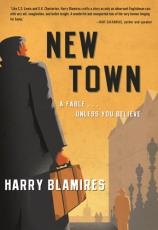New Town: A Fable
Review
New Town: A Fable
Much has been made of the relationship between Harry Blamires and C.S. Lewis. The two met when Blamires was a student of Lewis's at Oxford and they went on to become good friends. Since then, the 89-year-old Blamires has gone on to become a distinguished professor in his own right and published his own classics, including THE CHRISTIAN MIND. His latest book, NEW TOWN, is an allegory that explores the natures of both our earthly and heavenly homes.
It begins as Bernard Dayman drifts off to sleep for what he thinks might just be his last time. When he wakes up, he finds himself in a heretofore unknown town called Old Hertham. In this purgatory-cum-English village he quickly meets his old family physician, Dr. Fisher, who has become a real estate agent specializing in properties currently under construction in the New Town. Thinking he might as well settle down, Bernard inquires after purchasing one of these homes, but he's scratching his head before long:
" 'What are you offering?' Bernard sat down confidently on the polished oak chair provided for clients.
Dr. Fisher bent down under the counter and lifted into view a great leather-bound volume, the size of an enormous encyclopedia, with a red band on the spine. The gilt lettering stamped on it read NEW TOWN. The doctor laid the great book on the counter and turned the pages reflectively. Lists of properties with attached photographs filled the pages, but he didn't seem to be looking for any particular property in which to interest Bernard. Maybe he was meaning to draw attention to the size of the market.
'It seems to be a buyer's market, Dr. Fisher.'
'All markets are, Bernard. That's the nature of markets. But it isn't always easy to buy.'
'It isn't always easy to sell either,' Bernard said, feeling that bargaining was about to begin.
'Indeed. I don't know which is costlier --- to buy or sell. The purchaser may spend all, but the vendor sometimes pays a higher price.'
Baffled, Bernard reached a quick decision. To think of competing with Dr. Fisher in uttering obscure repartees was just not an option. He plainly knows all there was to know about the techniques of verbal mystification. It was time to get down to brass tacks. He leaned over the counter confidently.
'You'd like to sell me something Dr. Fisher?'
'I'd like you to have a good home, Bernard.'
'Same thing, I suppose.'
'No, but never mind. You'll learn.'"
And learn Bernard does. He leaves Dr. Fisher's office and runs into former flame Eve (whom he once courted at a place called Eden Falls). She offers him a place to stay at her home and there Bernard meets Eve's virtuous daughter, Marie. An awkward love triangle develops, but the more pressing issue is the fact that Old Hertham is falling apart. Literally. The ground gives way in big and little chunks everyday.
Getting to the New Town now seems to be rather urgent, and Bernard learns what it will take to get a home there (don't let all the paperwork fool you; it can be simple if your heart is in the right place). But he also learns that there are those --- Eve among them --- who think Old Hertham should be preserved.
The parallels are straightforward. Old Hertham is earth. The New Town is heaven. Marie offers Bernard a second chance at love after Eve left him for another man. The Society of Waiters (those who've been admitted to the waiting list for homes in the New Town) is the Church. It's clear that Blamires is trying to hammer home the idea that the earth (Old Hertham) is not our home and that our eyes should be fixed on heaven (the New Town). And yet, the story doesn't offer a compelling vision of either place. It's a theological treatise in a literary dress, but the dress is ill-fitting.
The British sensibility that infuses NEW TOWN is amusing, but the story is plodding in parts. I never connected with the characters and found it difficult to care about their fates. The theology of heaven that comes through the story is muddled at points --- especially when it comes to the hoops one needs to jump through to get on the "waiting list" for a home in the New Town. But such matters could have been chalked up to creative license if the story itself were more creative.
This book is far more likely to appeal to those interested in theology. Such readers will come away with more questions than answers, but this is often a good thing. Those looking for a good narrative are more likely to be left wanting.
Reviewed by Lisa Ann Cockrel on October 1, 2005




